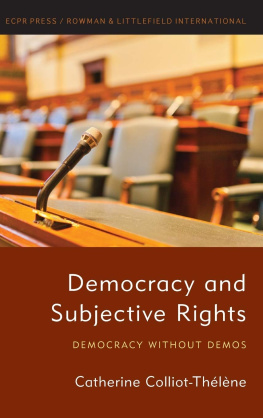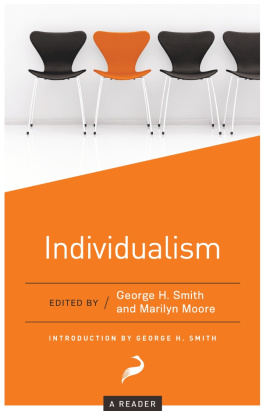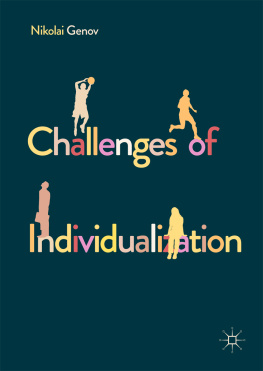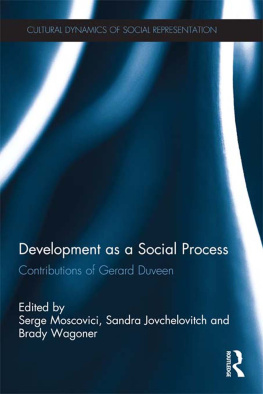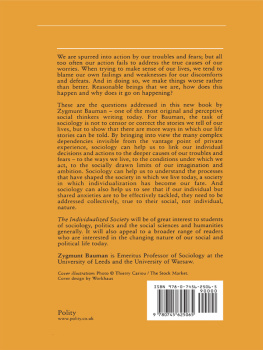PARADOXES OF INDIVIDUALIZATION
Dedicated to Jaap de Koster, born February 25, 2011
Paradoxes of Individualization
Social Control and Social Conflict in Contemporary Modernity
Dick Houtman, Stef Aupers and Willem De Koster
Erasmus University Rotterdam, The Netherlands
First published 2011 by Ashgate Publishing
Published 2016 by Routledge
2 Park Square, Milton Park, Abingdon, Oxon OX14 4RN
711 Third Avenue, New York, NY 10017, USA
Routledge is an imprint of the Taylor & Francis Group, an informa business
Copyright 2011 Dick Houtman, Stef Aupers and Willem de Koster
Dick Houtman, Stef Aupers and Willem de Koster have asserted their right under the Copyright, Designs and Patents Act, 1988, to be identified as the authors of this work.
All rights reserved. No part of this book may be reprinted or reproduced or utilised in any form or by any electronic, mechanical, or other means, now known or hereafter invented, including photocopying and recording, or in any information storage or retrieval system, without permission in writing from the publishers.
Notice:
Product or corporate names may be trademarks or registered trademarks, and are used only for identification and explanation without intent to infringe.
British Library Cataloguing in Publication Data
Houtman, Dick.
Paradoxes of individualization : social control and social conflict in contemporary modernity.
1. Individualism. 2. Conformity. 3. Social control. 4. Social conflict.
I. Title II. Aupers, Stef, 1969- III. Koster, Willem de.
302.5'4-dc22
Library of Congress Cataloging-in-Publication Data
Houtman, Dick.
Paradoxes of individualization : social control and social conflict in contemporary modernity / by Dick Houtman, Stef Aupers and Willem de Koster.
p. cm.
Includes bibliographical references and index.
ISBN 978-0-7546-7902-8 (hbk) -- ISBN 978-0-7546-7901-1 (pbk)
1. Individualism. 2. Individuality. 3. Social conflict. 4. Social control. I. Aupers, Stef, 1969- II. Koster, Willem de. III. Title.
HM12776.H68 2011
302.5'4--dc23
2011017631
ISBN 9780754679028 (hbk)
ISBN 9780754679011 (pbk)
Peter Achterberg (1977) is Associate Professor at the Centre for Rotterdam Cultural Sociology (CROCUS) at Erasmus University Rotterdam, The Netherlands. He is a cultural sociologist mainly interested in the culturalization of politics in contemporary modernity.
Stef Aupers (1969) is Associate Professor at the Centre for Rotterdam Cultural Sociology (CROCUS) at Erasmus University Rotterdam, The Netherlands. His principal research interests are religious change and spirituality, play- and game culture, Internet culture and conspiracy culture.
Samira van Bohemen (1987) is a PhD candidate at the Centre for Rotterdam Cultural Sociology (CROCUS) at Erasmus University Rotterdam, The Netherlands. Her principal research interests concern the performative aspects of gender and waxing intolerance in contemporary secularized societies.
Sebastiaan van Doorn (1980) is a PhD candidate at the Rotterdam School of Management at Erasmus University Rotterdam, The Netherlands. His principal research interests are corporate entrepreneurship, upper echelons, network theory and decision making.
Dick Houtman (1963) is Professor of Cultural sociology at the Centre for Rotterdam Cultural Sociology (CROCUS) at Erasmus University Rotterdam, The Netherlands. His principal research interests are the spiritualization and revitalization of religion and the culturalization of politics in contemporary modernity.
Roy Kemmers (1980) is a PhD candidate at the Centre for Rotterdam Cultural Sociology (CROCUS) at Erasmus University Rotterdam, The Netherlands. His research focuses on contemporary populism and, more generally, cultural conflicts in the West.
Willem de Koster (1984) is Assistant Professor at the Centre for Rotterdam Cultural Sociology (CROCUS) at Erasmus University Rotterdam, The Netherlands. He studies virtual communities as well as the genesis and manifestations of contemporary cultural conflict in Western countries.
Ineke Noomen (1979) is PhD candidate at the Centre for Rotterdam Cultural Sociology (CROCUS) at Erasmus University Rotterdam, The Netherlands. she is finishing her dissertation on religion and spirituality on the Internet, which addresses issues of marketization and mediatization.
Jochem Verheul (1981) obtained his Msc in Sociology at Erasmus University Rotterdam, the Netherlands, specializing in economic sociology. In 2009, he founded the internet consultancy agency Its a virus .
Jeroen van der Waal (1974) is Assistant Professor at Erasmus University Rotterdam, the Netherlands. His principal research interests entail the impact of economic globalization on social inequality, and the consequences of cultural change for value orientations and voting behavior in the West.
This book has its origins in a symposium titled Paradoxes of Individualization , organized on a pril 13, 2006, at the initiative of Marjolein kooistra, public relations officer at Erasmus Universitys Faculty of Social Sciences. Its formal aim was the presentation of a handful of research projects conducted at what would later become the Centre for Rotterdam Cultural Sociology (CROCUS) to an interested academic and non-academic audience. Intellectually speaking, however, the organization of the seminar challenged us to explore the common ground underneath apparently distinct and isolated research projects, addressing issues ranging from computer gaming to political conflict and from holistic spirituality to consumption. It quickly became clear that what constituted their common denominator was the theoretical problem of individualization, or more precisely: the increased social significance of moral individualism, this modern cultural ideal par excellence , which has not only massively proliferated in Western countries in the last half century, but has in the process grown into a major source of moral, religious and political conflict, too.
All three of us believe firmly that it is up to the social and cultural sciences to make the social world that we live in more comprehensible rather than obscuring it only further by taking refuge in idle postmodern or statistical messing around. This is why our plan to elaborate the seminar presentations into a full-blown book in Dutch elicited the ironic suggestion from one of us (Willem) that We must definitely make sure that the book becomes at least as complex as social reality itself. a conversation with Ashgates Neil Jordan in the Summer of 2008 convinced us to change course, however, and made us decide to write the book in English instead. From that moment on the project unfortunately started suffering from delay, particularly due to massive teaching assignments and a broad range of competing publication projects that demanded our precious time and attention. Because of that, the project could only start in earnest after two of us had been exempted from parts of their heavy teaching assignments from September 2009 onwards, although even then it had to compete with other publication projects that had suffered from delay.
The progress of this book has been impeded by two iron laws of contemporary academic life, in short: teaching always receives priority over research, and short-term journal articles always receive priority over long-term book projects, principally due to the ceaseless stream of revisions and resubmissions invoked by the former. We are grateful to Neil Jordan for his patience and his understanding that academia is no longer the quiet and easygoing environment for peaceful reflection, deliberation and discussion that it used to be in the past. The final obstacle to the completion of this book came as recent as February of this year, even though it had been forecasted with scientific precision no less than nine months in advance: the birth of Jaap de koster, son of Willem and Masja van Meeteren. If only for this brave and stubborn, yet in the end fortunately unsuccessful, attempt to incur further delay on this book, it would be unfair to dedicate it to anyone else but him.



